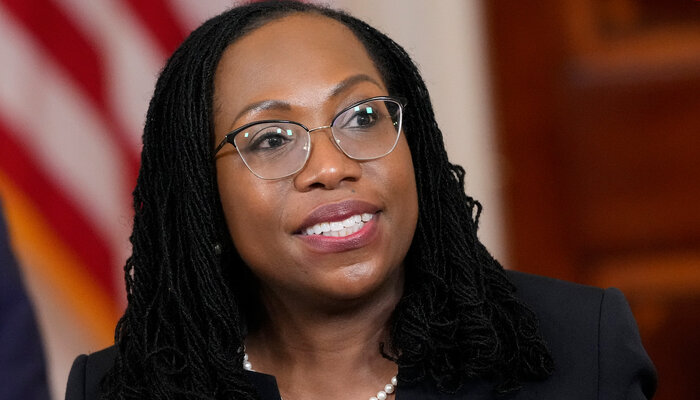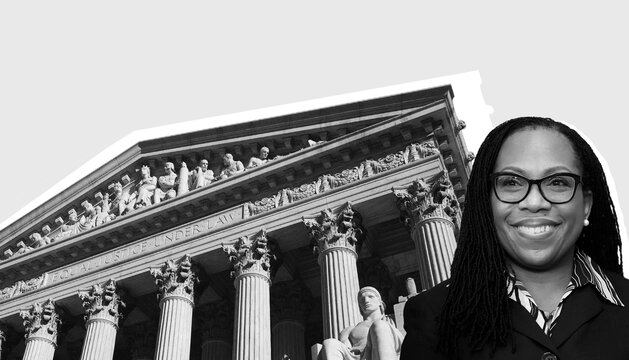
An Attack on Ketanji Brown Jackson’s Criminal Defense Work Is an Attack on the Constitution
Jackson’s record as public defender is rooted in the right to a fair trial.

Part of
Atticus Finch is a classic hero of American literature. And with good reason. In Harper Lee’s To Kill a Mockingbird, the fictional lawyer’s dogged defense of a Black man against trumped-up rape charges embodies the highest aspirations of our justice system: fairness, equality, compassion. And yet if Finch were a real lawyer today, some U.S. senators would probably say he isn’t fit to be a judge.
Before she became a judge, Ketanji Brown Jackson was a federal public defender for two and a half years, and she would be the first on the Supreme Court. Like Finch, she too represented some of society’s most disfavored people. When Jackson appears before the Senate Judiciary Committee for her confirmation hearing, we can expect some senators to assail her for this reason. They shouldn’t because public defenders are an essential part of our legal system.
Imagine if Finch’s client, Tom Robinson, hadn’t had a lawyer: a Black man in the 1930s South, pitted against the state, left to navigate alone the esoteric trial landscape. This would’ve hardly been a fair contest. Which is why the Supreme Court over a half century ago held that the Sixth Amendment’s guarantee of a fair and speedy trial also includes the fundamental right to an attorney in a serious criminal case, even if a person can’t afford one.
Yet it’s likely that some senators will say they view Jackson’s representation of criminal suspects as evidence of unfitness for the Court. To see why, consider a couple recent nominations of lawyers who, like Jackson, have navigated the criminal justice system for the accused.
Throughout her career, Nina Morrison, who President Biden nominated for a judgeship on the Brooklyn-based federal trial court, has freed dozens of wrongly convicted people as an attorney representing prisoners challenging their convictions. Yet rather than focus on Morrison’s accomplishments or acumen, a string of Republican senators lined up to connect her work to rising crime rates.
Escalating crime, Sen. Ted Cruz (R-TX) sharply told Morrison, is “the direct result of the policies you’ve spent your entire lifetime advancing,” referring to when Morrison advised the Philadelphia district attorney on the investigation and remediation of wrongful convictions. And Sen. Josh Hawley (R-MO) vowed to oppose Morrison’s nomination and any other Biden judicial nominee who’s “soft on crime” and “do[es] not understand the necessity of the rule of law.” That Ms. Morrison had worked to exonerate people convicted of crimes they didn’t commit was irrelevant.
Arianna Freeman fared little better. Seizing on her 12-year career as a public defender, some senators concluded that Freeman, who if confirmed would become the first Black woman on the U.S. Court of Appeals for the Third Circuit, would be unable to be fair-minded. Lamenting that she had “devoted [her] entire professional career to representing murderers, to representing rapists, representing child molesters,” Cruz branded her a “zealot” for defending a Pennsylvania death-row prisoner whose sentence the Supreme Court ultimately overturned in 2016 (which is, shall we say, rich for a man who also once represented a wrongly condemned prisoner on death row).
These attacks are patently misguided. Defending poor people accused of crime doesn’t make a judicial nominee any less capable of rendering objective judgment than does defending powerful corporate or government interests. Yet we don’t see senators writing off corporate lawyers — who constitute roughly 60 percent of all federal appeals judges — as incapable of exercising impartiality.
In fact, Jackson’s experience — so different from the current high court bench — as a public defender and a Black woman, has the potential to broaden perspectives which could over time shape outcomes. It may even nudge some justices to think differently on an array of issues. It certainly did for the colleagues of Justice Thurgood Marshall, the Supreme Court’s first Black member.
Months after Marshall stepped down, Justice Sandra Day O’Connor, who served with the civil rights hero for 10 years, penned a generous essay describing “the special perspective” he brought to the Court. Listening to heart-pounding stories from his days of dismantling Jim Crow, she recalled sitting at the justices’ conference table with him, “hoping to hear, just once more, another story that would, by and by, perhaps change the way I see the world.” Marshall told his colleagues, as Justice Bryon White reflected, “things that we knew but would rather forget; and he told us much that we did not know due to the limitations of our own experience.”
It’s hard to imagine that Atticus Finch, for some senators, would be able to pass muster for a seat on the bench. Of course, he went on to lose at trial, despite some conspicuous gaps in the government’s case. But that’s precisely why Finch is an icon: his unfailing representation of a politically unpopular client against the rigged machinery of government — the Sixth Amendment in action — has long stirred a nation to be a better version of itself. And it’s also why any attack on Jackson for standing up for the right to a fair trial is an attack on the Constitution.
More from the Ketanji Brown Jackson SCOTUS Nomination collection
-
Diversity Has Always Been a Factor in Supreme Court Nominations
President Biden is taking Supreme Court demographics into account. So did Reagan and Eisenhower. -
What Biden’s SCOTUS Nominee Will Face
The Supreme Court’s first black woman nominee will likely face a disproportionate number of questions on such issues as affirmative action, voting rights, law enforcement practices, and judicial activism. -
A Public Defender on the High Court
Ketanji Brown Jackson will be the first public defender to serve on the Supreme Court. Here’s why it matters.




